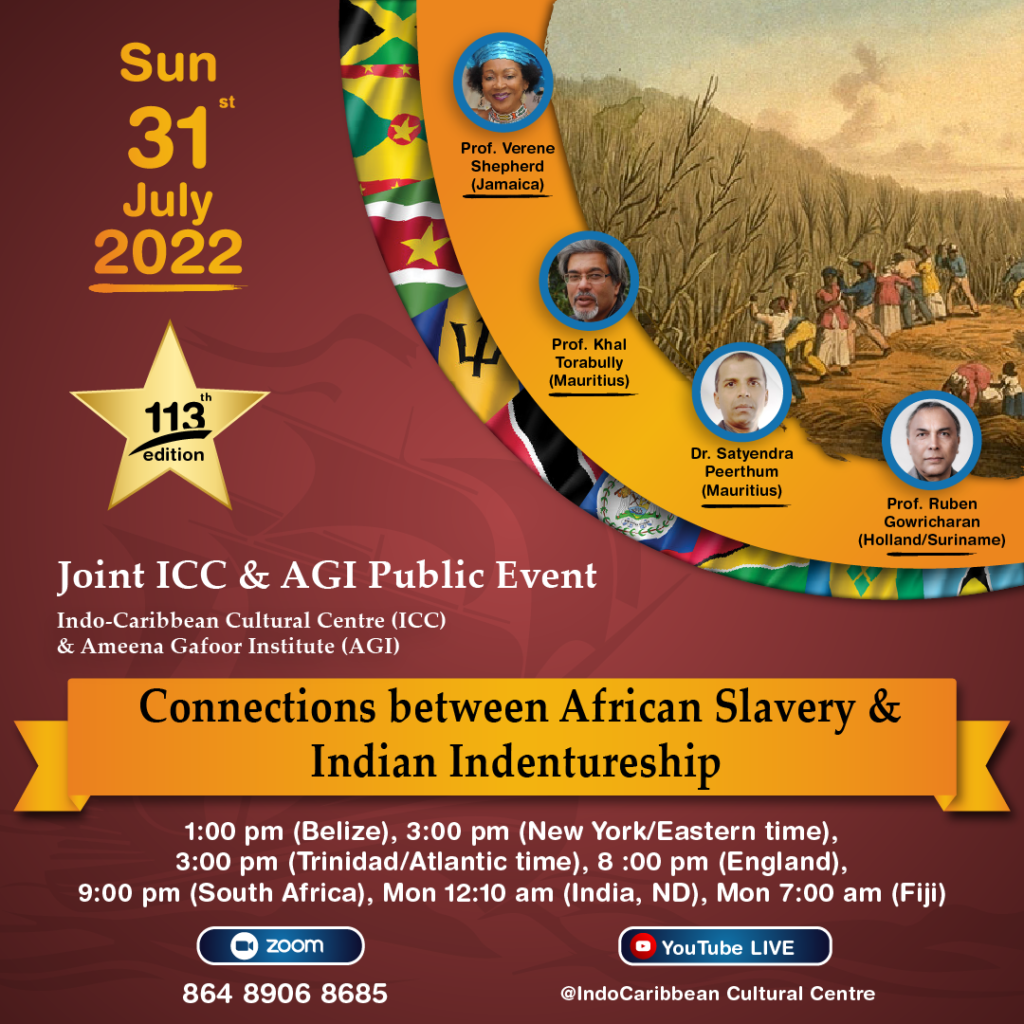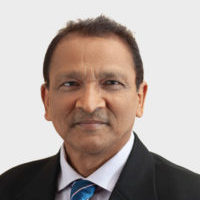
Invitation to our 113th ICC (+AGI) Zoom Public Meeting by Staff Reporter
Trinidad and Tobago (T&T) in the Caribbean will again celebrate Emancipation Day on Monday August 1st as a public holiday. The historic day has been celebrated since 1985 when T&T became the first country in the world to declare a national holiday to commemorate the abolition of African slavery throughout the British Empire on August 1st 1838. The country also observes Indian Arrival Day as a national holiday annually on May 30th to commemorate the first arrival of Indian indentured labourers from India to Trinidad in 1845, following the emancipation of enslaved Africans. During Indian Arrival Day, speakers and writers emphasize the common trauma of Indians and Africans under colonial rule, and the links between indentureship and slavery. It is a day of remembrance as well as reflection, and a time for celebration of unity in diversity.
Hugh Tinker’s seminal book entitled A New System of Slavery (1974) “established the paradigm that dominates scholarly and public discourse about the system of Indian indentured labour, which came into being during the 1830s and lasted well into the twentieth century. Tinker’s work entrenched the notion that the post-emancipation era witnessed the institutionalization of a new labour system that incorporated most of the repressive features of slavery. The impression that indentured workers were victimized by this system also figures prominently in governmental and popular perceptions of the indentured experience. At the heart of this discourse is a preoccupation with whether indentured labourers were ‘free’ or ‘unfree’ persons capable of exercising control over their own lives and destinies” (Richard Allen, 2012).
“In his novel Sea of Poppies (2008), Indian writer Amitav Ghosh emphasizes the fact that while the indentured laborer was not a slave per se, the indenture of South Asian laborers developed in the belly of plantation slavery. Without conflating the categories of slavery and indenture, the novel demonstrates that the indentured laborer’s decision to ‘accept’ indenture was prompted by the need to survive within a world of shrinking options for the Indian peasantry rather than a desire for personal mobility. Indeed, the Indian peasant-turned-indentured labourer faced a lack of choice, which, while not equivalent to the forced abduction of the African slave, must nonetheless be studied alongside it within an over-arching framework of the epistemic and material violence of nineteenth-century global capitalist-imperialist formations” (Nandini Dhar, 2017).
“The BBC Four documentary How Britain Reinvented Slavery (2010) takes a similar position, drawing parallels between the practice of slavery and indentureship. The introduction to the documentary reads as follows: ‘The slave trade was officially abolished throughout the British Empire in 1807. This documentary reveals one of Britain’s darkest secrets: a form of slavery that continued well into the 20th century – the story of Indian indentured labour.’ Similar views are echoed by David Dabydeen and Brinsley Samaroo in Across the Dark Water (1996); they argued that indentureship did indeed turnout to be a new form of slavery. In making this argument, scholars are not attempting to minimize slavery, and their scholarship should not be construed in this way” (Kowlasar Misir, 2009).
Please join us THIS SUNDAY for the 113th weekly ICC (+AGI) ZOOM Public Meeting, July 31, 2022 at (1.00 p.m. Belize), (3.00 p.m. New York/Eastern time), (3.00 p.m. Trinidad/Atlantic time), (3.00 p.m. Guyana), (4.00 p.m. Suriname), (8.00 p.m. England), (9.00 p.m. South Africa), (Sun 12 midnight, India, ND), (Mon 7.00 a.m. Fiji).
TOPIC: Connections between African Slavery & Indian Indentureship
SPEAKERS:
- Prof. Verene Shepherd (Jamaica) – Director of the Centre for Reparation Research, University of the West Indies (UWI). Vice-Chair of The CARICOM Reparation Commission.
- Prof. Khal Torabully (Mauritius) – Writer, poet, semiologist, and author of 25 books in French, English & Creole. Devised a theoretical framework to include slavery and indentureship.
- Dr. Satyendra Peerthum (Mauritius) – Historian, Aapravasi Ghat World Heritage Site. Member of the International Scientific Committee for the Indentured Labour Route Project.
- Prof. Ruben Gowricharn (Netherlands/Suriname) – Professor of Indian Diaspora Studies at the Vrije Universiteit Amsterdam. Finishing a book on Indian peasants in the Diaspora.
Followed by Q&A
Join Zoom Meeting THIS SUNDAY by touching or clicking on this link:
https://us02web.zoom.us/j/86489068685
Meeting ID: 864 8906 8685
No Passcode Needed
Find your local number: https://us02web.zoom.us/u/kcHMgV9IhA
Live-streamed on the YouTube channel of the Indo-Caribbean Cultural Centre
https://www.youtube.com/user/dmahab
Hosted by www.indocaribbeanpublications.com + https://ameenagafoorinstitute.org
WhatsApp +1 868 756 4961 or +1 868 381 0386
dmahabir@gmail.com, indocaribbeanstaff@gmail.com
Please SHARE

is a full-time anthropologist at the University of Guyana (UG) and Fellow of The Eccles Centre for American Studies, British Library (2022-23). He is a former Assistant Professor at the University of Trinidad and Tobago (UTT). He obtained his Ph.D. in Anthropology from the University of Florida (UF). As a doctoral student, he won a Florida Caribbean Institute Award, an A. Curtis Wilgus Grant, and an Organization of American States (OAS) Fellowship.
Mahabir received a National Award (Hummingbird Silver Medal) for his contribution to education in his country in 2011. He was among 50 recipients who received a Distinguished Alumni Award from the UWI Alumni Association.
Mahabir is the author of 12 books to date.
